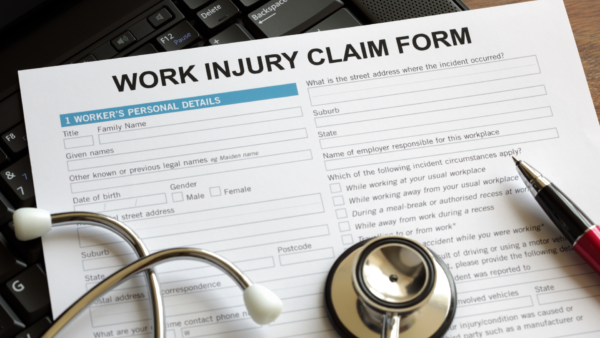North Florida Workers’ compensation Attorney
Gainesville ● The Villages ● Ocala ● Lake City ● Jacksonville
If you’ve been injured—or a loved one was killed—in a workplace accident in North or Central Florida, you need experienced, compassionate legal representation in your corner, and you need it now.
At Avera & Smith, our workers’ compensation attorneys have a proven track record of helping injured workers get the benefits they deserve. Partner Lance Avera is board certified in workers’ compensation law, a distinction that less than 1% of Florida workers’ compensation attorneys can claim. This certification signifies his expertise, experience, and ability to successfully help injured workers get their workers’ compensation claims approved. Lance and our team of workers’ compensation attorneys will protect you from employer retaliation, demand justice from insurance companies who refuse to pay, and fight to resolve disputed or denied claims.
Need assistance filing for workers’ compensation? Was your claim denied? Help is one phone call away. If you’ve been injured in a workplace accident in Gainesville, The Villages, Ocala, Lake City, Jacksonville, or surrounding areas, contact the experienced workers’ compensation attorneys at Avera & Smith for a free, no-obligation consultation.
We wil protect your rights after a work-related injury or illness
Once you report your workplace injury to your employer, your rights under Florida’s workers’ compensation laws kick in immediately. It does not matter who is at fault. It does not matter what job you were doing. It does not matter where you work or what company you work for. Under Florida law, if your employer or company has workers’ compensation insurance, you are covered by workers’ compensation benefits. At a minimum, your medical expenses and care should be covered. If your injuries or illness cause you to miss work, you should receive a portion of your lost wages.
At Avera & Smith, we fight for the rights of injured workers. On this page, you will find important information on how to file a workers’ compensation claim in Florida, including specific information on critical deadlines, the types of injuries and illnesses that are covered by workers’ compensation benefits, and what to do if you experience negative push-back from your employer or their insurance company. You don’t have to navigate this process alone. The workers’ compensation attorneys at Avera & Smith are here to help you.
If you have questions about any of the information on this page or if you would like to discuss your workers’ compensation claim, contact Avera & Smith for a free consultation.
What is workers’compensation?
Workers’ compensation is a form of insurance that provides benefits to employees who are injured or become ill due to their job. In Florida, the workers’ compensation system is designed to ensure that employees receive necessary medical care, lost wages, and other benefits without the need to prove fault. This system protects both employees and employers by providing a streamlined process for addressing workplace injuries and illnesses.
Key benefits of workers’ compensation in Florida:
- Medical benefits: Covers all necessary medical treatment related to the injury or illness, including doctor visits, hospital stays, surgeries, medications, and rehabilitation.
- Missed wages benefits: Provides a portion of lost wages if the injury or illness prevents you from working temporarily or permanently.
- Disability benefits: Includes temporary total disability (TTD), temporary partial disability (TPD), permanent impairment (PI), and permanent total disability (PTD) benefits, depending on the severity of the injury.
- Death benefits: Provides compensation to the dependents of an employee who dies as a result of a work-related injury or illness.
How to file a workers’ compensation claim in Florida
To file a workers’ compensation claim in Florida, there are specific steps you must take and important deadlines you must meet. Navigating the claims process can be intimidating, but understanding how the system works can help ensure you receive the benefits you deserve. Below, we provide a step-by-step guide on how to file a workers’ compensation claim in Florida.
1. Report the injury to your employer.
Under Florida law, you must report a workplace injury to your employer within 30 days of the incident to be eligible for workers’ compensation. For occupational diseases, the reporting period is 90 days from the first sign of illness. Failing to report a workplace injury within the time limit may jeopardize your eligibility for benefits.
When notifying your employer, provide as much detail as possible, including:
- When and where the accident happened
- What you were doing at the time of the accident
- What symptoms you are experiencing
- If there were any witnesses
In Florida, your employer can choose your treating doctor unless you require emergency treatment. Therefore, if your injury does not require immediate medical attention, it is advisable to report the injury to your employer before seeking care to ensure you receive treatment from a healthcare provider authorized by your employer or the workers’ compensation insurance carrier. When receiving treatment, inform the healthcare provider that your injury is work-related so that it is accurately documented in your medical records.
2. Complete a workplace injury report.
Once you have reported your injury to your employer, your employer must notify the company’s workers’ compensation insurance carrier within seven days. If your employer refuses to report your injury, you can contact the insurance company directly. The insurance company will then conduct an investigation to determine your eligibility for workers’ compensation benefits. A critical part of this investigation will be the workplace injury report.
Your employer should send you a copy of the First Report of Illness or Injury which they also file with their insurance carrier. If you do not receive a form to complete from your employer, you can obtain one from the Florida Department of Financial Services website here. The level of detail within your injury report can be crucial to the approval of your workers’ compensation claim. Florida requires that all employers keep meticulous records of all injuries or illnesses through the Occupational Health and Safety Administration. So, even if your employer tells you that it is not necessary, make sure you complete a workplace injury report and provide as much detail as possible.
3. Gather evidence and document everything.
Detailed documentation is essential for a successful workers’ compensation claim. Maintaining thorough records of the incident and your injury will help substantiate your claim and protect your rights if there are any disputes. Your records should include the following:
- Date, time, and location of the injury
- Circumstances surrounding the incident
- Witnesses to the incident
- Medical visits and treatments
- Communications with your employer and insurance company
4. File a workers’ compensation claim.
After you’ve reported your work-related injury to your employer and your employer notifies the insurance company, the insurance company will take over the claims process. Here’s what you can expect:
- Claim information packet: Upon receipt of the First Report of Injury or Illness from your employer, the insurance carrier should send you a claim information packet. This packet will include adjuster contact information, information on your rights and benefits, the return-to-work process, and a copy of the accident report.
- Claim investigation: As previously stated, the insurance company will conduct an investigation of the incident. Every insurance company is different, but generally, the investigation will ask for information regarding the following:
- Employee information
- Employee job information
- Employer information
- Injury information
- Medical care information
- Work information
It’s important to know that you don’t have to directly prove you sustained your injuries on the job. However, you will need to prove that your work significantly contributed to your injuries or illness. For example, some people develop severe arthritis by repeating the same motions over time. You might struggle to prove one incident caused your arthritis. However, you can show how the problems began while working and progressively got worse.
5. Follow-up on claim status.
Maintain open communication with your employer and the insurance company. Notify them of any changes or updates to your medical status and follow all recommended treatment and rehabilitation plans. Failure to comply with medical recommendations can affect your benefits.
6. Receive an acceptance or denial of your workers’ compensation claim.
If your workers’ compensation claim is accepted, you should receive payment within 21 days of your reported injury. Typically, these repayment checks will be sent to you every two weeks.
However, if you do not hear from your employer or the insurance company within 21 days or your claim is disputed or denied, you may have to take additional steps to resolve the issue. We provide more information on why workers’ compensation claims can be denied in the following section.
7. Hire an experienced worker’s compensation attorney.
If your worker’s compensation claim is denied, disputed, or delayed, contact a workers’ compensation attorney right away. An experienced workers’ compensation attorney will be able to review your claim and help you prove that your injuries or illness occurred while on the job. They will also protect your rights and negotiate with the insurance companies to ensure you receive the benefits you deserve.
Why are workers’ compensation claims denied?
In Florida, workers’ compensation claims can be denied for multiple reasons. Here are some common reasons why your claim may be denied:
- The injury was not reported within 30 days of the incident.
- You did not seek medical treatment for the injury or you refused to comply with the prescribed treatment plan.
- Your injury was not work-related. For a claim to be approved, the injury or illness must be directly related to your job or work requirements.
- Your injury is related to a pre-existing condition and not aggravated by work activities.
- There is lack of medical evidence proving the injury is work-related or requires treatment.
- Your injury is the result of misconduct, such as being under the influence of drugs or alcohol.
- There are discrepancies or inconsistencies in the claim. False statements or discrepancies between the injury report and medical records could result in a denial.
If your workers’ compensation claim is denied, it’s important to contact an experienced workers’ compensation attorney right away. At Avera & Smith, our workers’ compensation attorneys can investigate your claim and determine if you were wrongfully denied. We will then file an appeal, gathering the evidence and documentation needed to prove your eligibility.
What to do if your employer refuses your claim or retailates against you
Sometimes employers push back against employees who file a workers’ compensation claim. This can be through refusing to report your injury to the insurance company or retaliating with work restrictions or even termination. Employers may do this because they fear a workers’ compensation claim will increase insurance premiums and costs or reflect poorly on the company’s safety standards. However, it is illegal for an employer to intentionally hide or dismiss a workers’ compensation claim and retaliate against you.
If you find yourself in this situation, the best thing you can do is contact an experienced workers’ compensation attorney who will protect your rights. An attorney will ensure you are not taken advantage of by your employer and the insurance company. You may also be able to file a lawsuit against your employer if you were wrongfully terminated.

Injuries and illnesses covered by workers’ compensation in Florida
Florida workers’ compensation covers a broad range of injuries and illnesses, as long as they are work-related. Below, we provide a list of common injuries and illnesses covered by workers’ compensation in Florida. However, if you do not see your injury or illness listed, it does not mean you are not eligible for workers’ compensation. Call our workers’ compensation attorneys at 800-654-4659 for a free consultation to learn more about your legal options.
1. Traumatic injuries:
- Fractures and broken bones
- Sprains, strains, and tears (e.g., back, knee, shoulder)
- Cuts, lacerations, and puncture wounds
- Burns (thermal, chemical, or electrical)
- Eye injuries, including vision loss
- Head injuries, including concussions and traumatic brain injuries (TBIs)
- Amputations or loss of limbs
- Crush injuries from machinery or heavy objects
- Repetitive strain injuries (e.g., carpal tunnel syndrome)
2. Occupational illnesses:
- Respiratory conditions (e.g., asthma, bronchitis, or asbestosis) caused by exposure to harmful substances
- Skin diseases (e.g., dermatitis, rashes) from contact with chemicals or irritants
- Hearing loss due to prolonged exposure to loud noises
- Infectious diseases contracted in the workplace (e.g., COVID-19, hepatitis)
- Occupational cancers (e.g., mesothelioma, lung cancer) linked to toxic exposure
3. Cumulative trauma:
- Injuries that develop over time due to repetitive motion or strain, such as:
- Tendinitis
- Bursitis
- Carpal tunnel syndrome
- Chronic back pain
4. Mental and psychological conditions:
- Mental health conditions related to workplace trauma or stress (e.g., PTSD)
- Emotional distress caused by a severe workplace accident
What workers’ compensation in Florida does not cover:
There are some limitations and exclusions under Florida workers’ compensation laws:
- Injuries caused by the employee’s own intoxication or use of illegal drugs
- Self-inflicted injuries
- Injuries resulting from horseplay or fighting
- Injuries that occur while commuting to or from work, unless on a work assignment
- Injuries resulting from willful misconduct or violation of company policy
How to select the right workers’ compensation attorney
When searching for a Florida workers’ compensation attorney to represent you, look for these key attributes:
- Board certification – Less than 1% of attorneys in Florida are board certified in workers’ compensation. At Avera & Smith, partner Lance Avera is board certified in workers’ compensation law, which signifies his immense experience, expertise, and success at appealing denied or disputed claims.
- Specialization – In Florida, many personal injury firms claim they handle workers’ compensation claims; however, it’s important to find a firm with a dedicated workers’ compensation department. At Avera & Smith, we have a full-service workers’ compensation department with a legal team committed to helping you file and appeal all types of workers’ compensation claims.
- Experience – Find a workers’ compensation lawyer with experience that is relevant to your case. Their prior experience can strengthen your lawsuit. They can use what they’ve learned over the years when building your case. At Avera & Smith, we have over 70 years of experience representing injured clients throughout Florida. We are one of the oldest law firms in the state, and our results and reputation speak for themselves.
Need help filing or appealing a workers’ compensation claim in Florida?
Call our North Florida workers’ compensation attorneys at 800-654-4659 for a free consultation.
If you are injured while on the job in Gainesville, Ocala, Lake City, The Villages, or Jacksonville, contact the experienced workers’ compensation attorneys at Avera & Smith. Free of charge, we will set up an in-person or over-the-phone consultation to help you understand your rights and legal options. We specialize in appealing denied, disputed, or delayed workers’ compensation claims. You don’t have to navigate the system alone. We are here to help you get the benefits you deserve.

